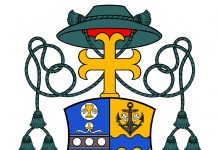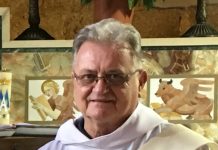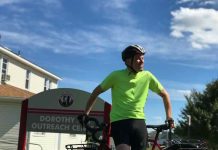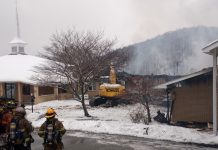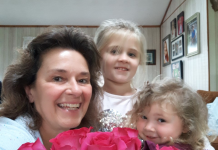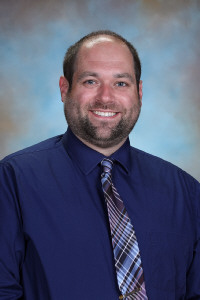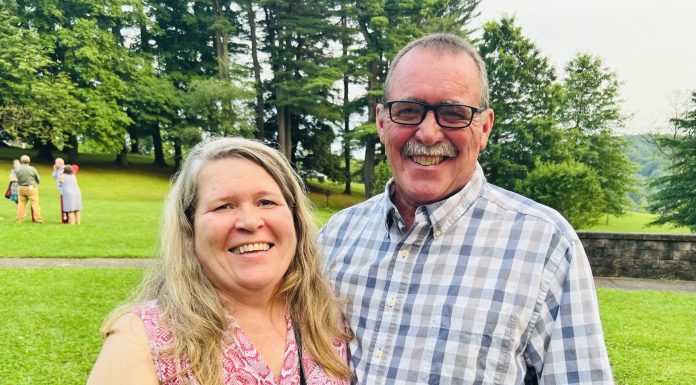Column by Jonathan Nagy
On the evening of September 6, 1780, while spending the night in a cabin high atop the Kickelhahn Mountain near Ilmenau, deep in the forest of south-central Germany, the German poet Johann Wolfgang von Goethe wrote his poem Wanderer’s Nightsong II, a sequel to his Wanderer’s Nightsong I written four years earlier. While not one of his more popular works due to many interpreting the poem as having a dark overtone, its true meaning is one of beauty, filled with God-inspired imagery.
Translated by Henry Wadsworth Longfellow from German:
O’er all the hilltops
Is quiet now,
In all the treetops
Hearest thou
Hardly a breath;
The birds are asleep in the trees:
Wait, soon like these
Thou too shalt rest.
Many composers have set this poem to music, including the great Johannes Brahms. One of Brahms closest friends, Theodor Billroth, once asked the composer what beauty he found in such a short but dark poem. Brahms replied, “The beauty and greatness of the overall. From the heavens over the summits down to the treetops of the forest. The silence as well in bustling nature; the allusion to sleep and the death of the person. Man as a part of nature, yet containing and assimilating all of nature in himself.”
Taken into a new light by Brahms, this poem speaks so highly of not only the beauty of nature, but the beauty of silence in nature. It is also a reminder to us that while we are here on earth, that we shall all eventually rest with God in the same quiet stillness of what surrounds us. The goal of reaching that eternal paradise as described throughout the Bible is what keeps the faith of many who are suffering stronger than most. A popular quote that has circulated the last few years has been, “The walls of hospitals have heard more prayers than the walls of churches.” While that may be a stretch, I do not doubt the fervor of the prayers said in hospitals. I have also spoken with many who work in hospitals and who note the peace that is seen in those who are so close to meeting Jesus. I have witnessed this with my own eyes of my grandmother, who, despite many medical ailments, never waivered from her faith, but instead, strengthened her faith through her suffering. The idea of “offering it up” was exemplified by her life.
This poem is a stark reminder of not only the glory God has created in nature, but our earthly bodies becoming one with that same nature in the end. On Ash Wednesday, we are reminded that, “From dust you were made and to dust you shall return.” We are also part of nature and are expected to be caretakers of what God has provided us.
In 2015, Pope Francis wrote his second encyclical, Laudato Si, which focused on how we as humans are caretakers of the world God has given us. Many of the phrases and quotes were inspired by Saint Francis of Assisi’s Canticle of the Sun. As a great lover of nature, a few quotes from that encyclical speak to me. The first reads, “Because all creatures are connected, each must be cherished with love and respect, for all of us as living creatures are dependent on one another.”
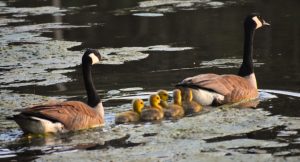 I have had a pair of geese make their summer home at my pond each year since I have lived in my house. Some years, they are not successful in raising goslings. This year, however, they have raised five goslings. I enjoy watching them from my porch as they meander around my lawn. The mother leads the way, showing the goslings where to go, what to eat, how to avoid danger, and so much more. The father, at the back of the line, always has a watchful eye, protecting his family from all dangers and harm. I believe we can learn many lessons from these geese, which, as Pope Francis said, is because all creatures are connected.
I have had a pair of geese make their summer home at my pond each year since I have lived in my house. Some years, they are not successful in raising goslings. This year, however, they have raised five goslings. I enjoy watching them from my porch as they meander around my lawn. The mother leads the way, showing the goslings where to go, what to eat, how to avoid danger, and so much more. The father, at the back of the line, always has a watchful eye, protecting his family from all dangers and harm. I believe we can learn many lessons from these geese, which, as Pope Francis said, is because all creatures are connected.
Our mother, Mary, is our guide through life. She is a quiet, tender, loving example. We can picture her motherly direction, leading us to the good, especially her very own Son. Then we have our heavenly Father, who is always there to watch and protect us from all harm. Both our Mother and our Father are there for us always, as is their Son, who is the alpha and the omega, in front and beyond us. The deep connection between humans and nature can be clearly seen when taking the geese and the Holy Family together. We are enveloped in love and care by the best possible guidance we can have.
I will be quite sad when the geese finally leave my pond, for I have enjoyed watching them grow. But the mother and the father will raise them and trust them to use the guidance they have been given to have a long and full life, eventually raising goslings of their own. Geese can live up to 30 years, so they have a great chance to do so! They say that no matter the species, a mother never forgets her children. I would guess if she came across her goslings in the future after they have “flown the coup,” this mother would still show her love and concern. Our Mother, Father, and Brother Jesus are never far away from us. No matter how far we may stray, they are always there for us and never forget us.
The second quote from Laudato Si that touches me reads, “We have only one heart, and the same wretchedness which leads us to mistreat an animal will not be long in showing itself in our relationships with other people. Every act of cruelty towards any creature is contrary to human dignity.” Yes, God put animals on the earth to help us work the earth and nourish us with the food they provide. He never once said we could abuse them. I find it incredibly difficult to watch the ASPCA commercials that are shown on TV depicting dog abuse. I go to my dog and hug her each time reassuring us both that she is loved and cared for and always will be. Pope Francis is exactly right in saying that those who mistreat animals will also show that in relationships with other people. If the dignity of a defenseless animal cannot be respected by some, then there is not much hope for the people that surround them.
Respect for all life, from natural birth to natural death, is unfortunately something that is not upheld by many in our current culture. We have been tasked by God to take care of the earth, especially one another. Individuals need to take the time to look out for one another, especially the most vulnerable in our communities, including the unborn and the elderly.
Pope Francis ties both of those quotes together towards the end of the document, stating, “If we want to bring about deep change, we need to realize that certain mindsets really do influence our behavior. Our efforts at education will be inadequate and ineffectual unless we strive to promote a new way of thinking about human beings, life, society, and our relationship with nature.” In my opinion, that new way of thinking is not entirely new, but instead, is rarely used. The concept of dignity eludes many. The respect for nature, the respect for others, and even self-respect have taken a major hit in recent years. We need to change our mindsets and realize that we are part of this natural cycle. Eventually, our bodies will deteriorate away, and then our souls are left to find a home, which hopefully is with God in heaven.
Returning to Goethe’s poem, sometimes we are too noisy in our own minds to listen to the beauty of the quite stillness in nature. When things are most quiet is often when we hear God speaking to us. There is an old Protestant hymn entitled Speak, Lord, in the Stillness. The first two verses read, “Speak, Lord, in the stillness, while I wait on Thee; Hushed my heart to listen in expectancy. Speak, O blessed Master, in this quiet hour; Let me see thy face, Lord, feel thy touch of power.” If we can find that quiet, we can hear God speaking to us. One cannot deny the great power of God when observing nature and all that He created.
In speaking about nature, John Burroughs once said, “I come here often to find myself. It is so easy to get lost in the world.” Take a quiet walk in the forest, sit by a running stream, or watch some birds flutter around. By doing so, you will see how everything that God created resounds with all of nature. We are called to be caretakers of earth, and others, especially God, learn so much about us based on how we care for what we have been given.
As the poet wrote, “The birds are asleep in the trees. Wait, soon like these, thou shalt rest.” Enjoy and care for this planet, for it is a great gift from the God of all creation!
Jonathan Nagy, M.Ed., is the Dean of Students and Social Studies teacher at Bishop Carroll Catholic High School in Ebensburg. He is also the Music Director at the Basilica of Saint Michael the Archangel in Loretto.


